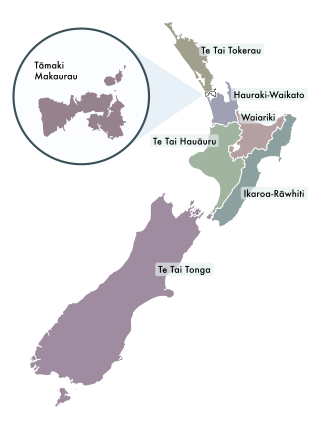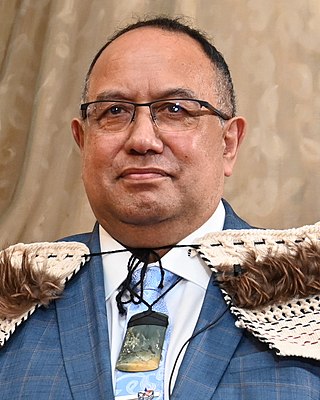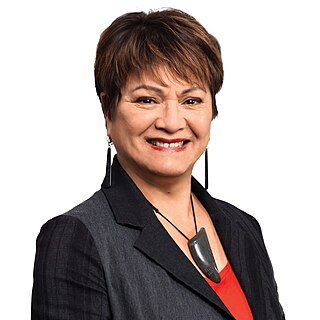
The 1996 New Zealand general election was held on 12 October 1996 to determine the composition of the 45th New Zealand Parliament. It was notable for being the first election to be held under the new mixed-member proportional (MMP) electoral system, and produced a parliament considerably more diverse than previous elections. Under the new MMP system, 65 members were elected in single-member districts by first-past-the-post voting, while a further 55 "top-up" members were allocated from closed lists to achieve a proportional distribution based on each party's share of the nationwide party vote.

Dame Tariana Turia is a former New Zealand politician. She was first elected to Parliament in 1996. Turia gained considerable prominence during the foreshore and seabed controversy in 2004, and eventually broke with the Labour Party as a result. She resigned from parliament, and successfully contested a by-election in her former electorate as a candidate of the newly formed Māori Party, of which became a co-leader. She retired from Parliament in 2014.

The Te Tai Hauauru by-election was a by-election in the New Zealand electorate of Te Tai Hauāuru, one of the Māori electorates. The date set for the by-election was 10 July 2004. It saw the re-election of Tariana Turia, a former MP for the Labour Party and now co-leader of the Māori Party.

In New Zealand politics, Māori electorates, colloquially known as the Māori seats, are a special category of electorate that give reserved positions to representatives of Māori in the New Zealand Parliament. Every area in New Zealand is covered by both a general and a Māori electorate; as of 2020, there are seven Māori electorates. Since 1967, candidates in Māori electorates have not needed to be Māori themselves, but to register as a voter in the Māori electorates people need to declare that they are of Māori descent.
The Nga Iwi Morehu Movement was a New Zealand Māori political party. Its name literally translates as "the surviving people" or "the remnant people". It contested the 1996 election as an unregistered party, running a single candidate and gaining 194 votes. It ran two candidates in the 2002 election, winning 522 votes. In the 1999 election, members of Nga Iwi Morehu stood under the banner of the Freedom Movement.
Piri Wiri Tua Movement was a Māori political party in New Zealand associated with the Ratana movement. It was formed in 1999 with the aim of establishing a separate Māori assembly that would work in a partnership alongside Parliament to administer Māori affairs, social services, health and education and the Māori Land Court. The party's leader Te Kaiarahi Hui said the party's name referred to working closely with others to achieve benefits for Māori. He said Ratana had taken on the role of Piri Wiri Tua when he worked to meet the needs of Māori people.

Clutha-Southland was a parliamentary constituency returning one member to the New Zealand House of Representatives. The last MP for Clutha Southland was Hamish Walker of the National Party. He held the seat for one term, being elected at the 2017 general election and representing the electorate until the 2020 general election where he retired from Parliament, and the seat was replaced with the Southland electorate.

Te Tai Tokerau is a New Zealand parliamentary Māori electorate that was created out of the Northern Maori electorate ahead of the first Mixed Member Proportional (MMP) election in 1996. It was held first by Tau Henare representing New Zealand First for one term, and then Dover Samuels of the Labour Party for two terms. From 2005 to 2014, it was held by MP Hone Harawira. Initially a member of the Māori Party, Harawira resigned from both the party and then Parliament, causing the 2011 by-election. He was returned under the Mana Party banner in July 2011 and confirmed at the November 2011 general election. In the 2014 election, he was beaten by Labour's Kelvin Davis, ending the representation of the Mana Party in Parliament.

Te Tai Hauāuru is a New Zealand parliamentary Māori electorate, returning one Member of Parliament to the New Zealand House of Representatives, that was first formed for the 1996 election. The electorate was represented by Tariana Turia from 2002 to 2014, first for the Labour Party and then for the Māori Party. Turia retired and was succeeded in 2014 by Labour's Adrian Rurawhe who retained the seat in 2017 and again in 2020.

Hauraki-Waikato is a New Zealand parliamentary Māori electorate first established for the 2008 election. It largely replaced the Tainui electorate. Nanaia Mahuta of the Labour Party, formerly the MP for Tainui, became MP for Hauraki-Waikato in the 2008 general election and was re-elected in 2011, 2014, 2017 and 2020.

The 2014 New Zealand general election took place on Saturday 20 September 2014 to determine the membership of the 51st New Zealand Parliament.
The Mana Movement, originally known as the Mana Party, is a former political party in New Zealand. The party was led by Hone Harawira who formed it in April 2011 following his resignation from the Māori Party. Harawira won the by-election in Te Tai Tokerau of 25 June 2011 for the Mana Party and retained the seat during the 2011 general election in November.

Rino Tirikatene is a New Zealand politician and a member of the House of Representatives, representing the Te Tai Tonga electorate from the 2011 election to 2023 election and subsequently elected as a list MP. He is a member of the Labour Party. He comes from a family with a strong political history.

71 members of the New Zealand House of Representatives were elected in the general election on 20 September 2014.

Adrian Paki Rurawhe is a New Zealand Labour Party politician. He has been an MP since 2014, and the speaker of the New Zealand House of Representatives since 2022.

The 2020 New Zealand general election was held on Saturday 17 October 2020 to determine the composition of the 53rd New Zealand Parliament. Voters elected 120 members to the House of Representatives, 72 from single-member electorates and 48 from closed party lists. Two referendums, one on the personal use of cannabis and one on euthanasia, were also held on the same day. Official results of the election and referendums were released on 6 November.

Seventy-one members of the New Zealand House of Representatives were elected from electorates in the general election on 23 September 2017.

67 electorate members of the New Zealand House of Representatives were to be elected in the general election on 27 November 1999. The tables below show the candidates for each electorate. Incumbent electorate MPs are highlighted in blue, and those candidates who were members of the previous parliament via their party list—regardless of which electorate they previously contested—are highlighted in red.
Debbie Anne Ngarewa-Packer is a New Zealand politician, iwi leader and activist. She is a Member of Parliament and co-leader of Te Pāti Māori alongside Rawiri Waititi, and is the chief executive of the Ngāti Ruanui iwi.

Soraya Waiata Peke-Mason is a New Zealand politician. She was a Member of Parliament in the House of Representatives for the Labour Party from 2022 to 2023.














